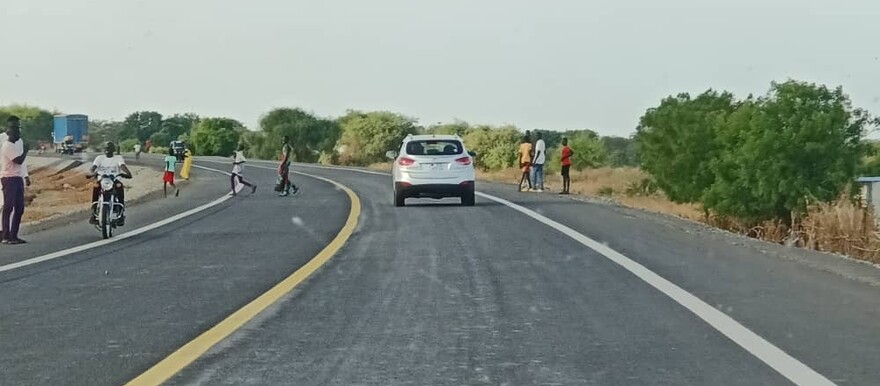The new tarmac Juba-Bor Highway that connects the South Sudan capital Juba to the Jonglei State capital, Bor was recently completed and residents in Bor say it has positively impacted livelihoods.
Several Bor town dwellers sounded by Radio Tamazuj over the weekend said that the sparkling highway is a game changer and has improved transportation, access to markets, and boosted business.
Akur Ruben, 29, who runs a cafeteria in Bor says her life has improved as fresh foods reach her timely.
“Life has changed not just for me but the all the people of Bor. Things (commodities) now reach me on time,” she says. “Those days items like avocados, bananas, and fresh chicken could go bad while being transported from Juba to Bor but now I receive them fresh and refrigerate them. So, nothing goes bad now. Before the road was completed, the fresh chicken would get spoilt and I had to give them to my relatives”
“I used to earn SSP 25, 000 a day before the road was fixed but I now pocket 32,000 daily,” Akur adds.
The 202-kilometer was constructed by the African Resources Corporation (ARC), a local South Sudanese company, and inaugurated in January by President Salva Kiir.
Another Bor resident, Kenya Mach, who is the finance secretary of the Jonglei State Women’s Union (JSWU), says the tarmacked road has brought economic prosperity and health services are now more accessible.
“This road is of help and not just for business. Last week, I went to Juba for medication and managed to return to Bor on the same day,” she says. “As we speak, there are more than 500 women involved in business along the Juba-Bor road. When this road was bad, the number of Bor women in business was just between 200 and 250.”
“Our women and young girls are running restaurants and exporting fish to Uganda and the Democratic Republic of Congo (DRC) and this translates into education and medicate for our children,” Mach adds.
The completed Juba-Bor Highway is the first phase of an infrastructure project that is expected to connect the Upper Nile region.
During the launch in January, officials said the highway, once completed, will be one of the longest four-lane dual carriage highways in East and Central Africa.
Meanwhile, Ayuen Kur, the deputy secretary general of the Jonglei State Chamber of Commerce, confirms that trade is indeed flourishing.
“The road is good and goods arrive on time. However, as we all know, the exorbitant dollar is the only reason why commodity prices are high and this affects our people,” he explains. “Generally, the benefits of the new road, even for the government are monumental because our state is generating a lot of revenue and this is positive for our economy.”
“For instance, daily more than 15 trucks of 40 to 50 tonnes loaded with fish leave for Juba, Uganda, and the DRC,” Kur adds.
Mach however says tall is not rosy and crime and ambushes have been on the rise along the new road.
“The only problem now is highway crime. You might have heard about the recent attacks in which tens of lives were lost. Our government should intervene,” she said. “Those attacking travelers should know that they have nothing to do with the power. They (attacker) should engage the government in Juba and let ordinary citizens about their lives.”
As for the commuter drivers, Thon Philip, the head of the Jonglei State Drivers’ Union, says they are yet to enjoy the dividends of the highway.
“This highway is only helping our cars in that they do not break down because we are driving on a smooth surface and travelers reach Bor in two hours. Also, sick people can seek medical attention in Juba faster now,” he enlightens. “Unfortunately we are not profiting because fuel prices keep skyrocketing while fares have remained stagnant at SSP 7,000 since 2021.”
According to Thon, accidents are also on the rise because people purchase vehicles and give them to inexperienced drivers.
“Unskillful drivers are also on the road and this has led to a rise in accidents,” he adds.
The Jonglei State traffic police commissioner, Maj. Gen. Samuel Bidik Puot concurs with Thon and says that while the highway should be celebrated as a gift, accidents which often result in deaths, are on a record high.
“In our 2022 report, we lost 34 people to road accidents while 296 other people had fractures and 100 more sustained minor injuries. The reason is that our youth want to reach Bor or Juba fast and drive at a speed of 180 kilometers per hour,” he says. “This road is too long and we recommend that people drive carefully and take at least three hours.”
Asked what they are doing to curb the accidents, Gen. Bidik says the youthful drivers are difficult and do not listen to traffic advice.
“Our youth do not listen to us. A diver wears slippers, shorts, and a vest while driving and they speed. We tell them this wrong and they respond by saying that we (police) will not be accountable if they are to die in an accident,” he says. “We need streetlights and cameras along the highway to help us catch drivers red-handed and punish them accordingly.”
I also urge drivers to be civilized and respect traffic officers because we are there for them,” Gen. Bidik adds.
For his part, the Jonglei State minister of lands and public utilities, Abraham Mamer Kur, says the Juba-Bor Highway which has created employment and business opportunities, is a government gift to the people.
“In terms of infrastructure, Bor is now next to Juba and we are thankful to our president as our economy has improved a lot,” he says. “The people of Juba are also enjoying fresh fish from Bor.”




